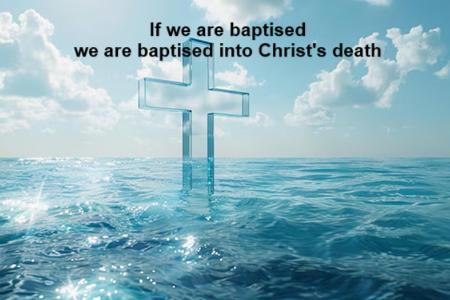The Beauty of Baptism
The Beauty of Baptism

Most ministers will be familiar with applicants for baptism for their child who think that baptism it is essential for salvation or that it actually coveys the grace of which it speaks. This view had been common before the Reformation and continued very much the emphasis of the Church of Rome. But it is also true that baptism is frequently neglected nowadays and a position taken up that in effect says that the child can decide for itself when he or she is old enough. This essentially Baptist approach was also in view when the Westminster Divines were meeting, as the new and small Baptist movement was very vocal in the 1640s and its ideas were spreading.
The Divines wrote in their first completed production, the Directory for the Public Worship of God, that,
outward baptism is not so necessary that, through the want thereof, the infant is in danger of damnation or the parents guilty, if they do not contemn (despise) or neglect the ordinance of Christ when and where it may be had.
Two years later they wrote in their Confession of Faith (28:5) Although it is a great sin to contemn [despise] or neglect this ordinance [of baptism] yet grace and salvation are not so inseparably annexed unto it, as that no person can be regenerated or saved without it, or that all that are baptised are undoubtedly regenerated.
It is likely that most Australian Presbyterians accept that baptism is not essential to salvation, but it is less clear that all are convinced that it is a great sin to neglect it. We need to explore what our fathers in the faith understood to be the nature and effect of baptism to understand what is involved.
What is a Christian?⤒🔗
A Christian is essentially a disciple or follower of Jesus, but we don’t make ourselves disciples. If people are commonly said to fall in love – an expression suggesting that they couldn’t help it, there is a sense in which this is true of Christians too. Christians are chosen in Christ from before the foundation of the world. The Lord opens their hearts to receive the truth (Acts 16:14). We indeed respond to God’s grace, but it is God who both takes the initiative and enables us to respond by a saving faith. Such a faith unites us to Christ, and brings us into the fellowship of Christ’s people, the church, so that we are light to the world (Matthew 5:14). We are called to be God’s special people to proclaim the praises of him who called us out of darkness into his marvellous light (1 Peter 2:9).
The previous paragraph highlights three things often neglected or misunderstood:
-
The wonder of God’s gracious election – his choice before our choice;
-
The vital reality of union with Christ;
-
The importance of the church.

Baptism the Norm for Disciples←⤒🔗
The New Testament does not envisage a person being a disciple without being baptised. It’s the normal and expected thing. Whether old or young, male or female, at night in a prison or travelling through the wilderness, baptism of those who profess faith is the rule, and is easily administered, even by one who had been beaten and imprisoned (Acts 16:22). It is not John’s baptism but Christian baptism (Acts 19:4-5), yet the two are linked in some ways, for Jesus was baptised by John.
John said Jesus would baptise with the Holy Spirit and with fire (Matthew 3:11). In the context this means the fire of judgment. John doesn’t understand the full significance of what he says. Thinking perhaps of water baptism as a sign of cleansing, he was not comfortable baptising Jesus, but Jesus said, ‘Permit it now; it is proper to do this to fulfil all righteousness’ (Matthew 3:15). Whatever else this means, it surely includes reference to Jesus self-identification with sinners which ultimately leads to the Cross where Jesus is judged in their place. Jesus himself says:
I have come to bring fire on the earth, and how I wish it was already kindled! But I have a baptism to undergo, and how under pressure I am until it is accomplished!Luke 12:49-50
He desires the fire to be poured out that will result in division among people (Luke 12:51ff), but he must undergo the baptism of his death for that to occur. Linking in with Matthew 3:11, it would seem that the primary reference is to the fire of judgment – a judgement that brings salvation through the Spirit, but also a judgment which brings condemnation to those who do not believe.
If water baptism in some way points to the Cross we can understand how important it is. If you reject it you are in a sense rejecting Christ’s death for sinners. In the same way the Old Testament rite of circumcision was seen as encapsulating God’s covenant, and those who refused the visible sign were to be cut off from the people in judgment (Genesis 17:10,14 cf. Exodus 4:24ff).
Circumcision and Baptism←⤒🔗
The link between circumcision and baptism is not simply a matter of inference. Paul, in rejecting the necessity of physical circumcision, says that believers were circumcised with a circumcision made without hands through the putting off of the body of the flesh, by the circumcision of Christ (Colossians 2:11-12). There are two possible meanings to these verses.
Most likely Paul is saying that the death of Jesus (the putting off the body of the flesh, cf. Colossians 1:22) was the circumcision of Christ, with the implied token physical cutting which anticipated it now superseded, since by virtue of union with Christ they have been buried and raised with him to new life. Or we may take ‘the body of flesh’ to refer to the believer’s sinful nature (as in NIV), in which case the circumcision God has accomplished in Christ (the inward removal of sin) is symbolised by baptism which renders physical circumcision obsolete. In other words, Christ’s death is the basis of the true circumcision of the believer, and our participation in Christ has baptism as its visible sign.
We can conclude from the foregoing that circumcision and baptism are linked in that both point to Christ, and both include the idea of symbolically removing that which defiles. Further, in the earlier time circumcision was the sign and seal of God’s covenant, while in the new covenant baptism has that function.
Children←⤒🔗
This leads us to the view that without a specific repeal in the New Testament the place of children in the covenant is secure, and this is confirmed by the references to the baptism of households (Acts 16:15; 34). True, only male Israelites were circumcised but the whole nation was considered to be the covenant people of God. Infants were circumcised at eight days when they knew nothing of what was happening. But how well this reminds us that the Gospel is first and foremost about what God has done and does, not what we have done or do!

The family is good, but sin has entered and defiled all relationships. Yet God’s grace acts against sin, not against the family. Those who belong to Christ are Abraham’s spiritual children and heirs of the promise God gave him (Galatians 3:29). At its most fundamental the promise is:
I will be your God and the God of your children after you.Genesis 17:7
There is nothing more wonderful than this in the new covenant; rather the profound implications of God’s commitment to his people is revealed in the person and deeds of the Son of God who loved us and gave himself for us.
The Meaning of the Word←⤒🔗
When we look at the meaning of the Greek word for baptism as used in New Testament times it does not refer to an action which requires submersion in water. Nor should we be content to describe the idea of baptism simply as washing or purification. Originally, baptizo (I baptise) was an intensive form of the word bapto, to dip, and thus originally meant an effective dipping and then dyeing, since materials were immersed in the dye. But soon the focus moves from the dipping/immersion to the change wrought by the action.
In the Greek translation of the Old Testament circa 200 BC, the Septuagint, there are only two uses of baptizo despite a number of places where total immersion is in view. In Isaiah 21:4 it is used for the horror that overwhelmed the prophet when he saw the vision of Babylon’s fall; in 2 Kings 5:14 it describes Naaman’s dipping himself seven times in the Jordan and experiencing cleansing from his leprosy. The common idea in these two cases is not immersion but the transforming effect of the experience.
In short, baptizo can refer to a literal or metaphorical washing that brings about a new state of affairs. Thus classical Greek writers use it for a sunken ship which lies on the bottom of the sea instead of sailing proudly over it, or for those baptised with wine so as to be in a drunken state, or for those overwhelmed by debt. In religious contexts it embraces ritual washings designed to remove disqualification in God’s sight.
There is no Old Testament precedent which provides a satisfactory basis for an immersion baptism, as almost all were sprinklings or of a self-administered general nature.
Given the root idea of a literal or metaphorical washing which brings about a new state of affairs, we can more deeply appreciate Jesus’ reference to his death as a baptism. It is an experience which is absolutely transforming, marks Jesus’ transition from the state of humiliation to the state of exaltation, ratifies the new covenant and secures life for all believers.
Our water baptism does not involve the spilling of blood as did circumcision. The blood that truly circumcises the heart has been shed by Jesus. It is through the effective work of God’s Holy Spirit that we are brought into a faith-union with Christ, and the sprinkling of clean water is a suitable method of baptism with Biblical warrant (cf. Ezekiel 36:25-27). The likely early mode was by sprinkling or pouring while standing in shallow water.
It is vital to recognise that becoming a Christian means union with Christ. If we are baptised we are baptised into his death (Romans 6:3). The meaning of baptism is the key thing, and attempts to illustrate death, burial and resurrection by the mode of baptism inevitably fail.

Church and Family←⤒🔗
Our brief review challenges us with the implications of baptism. The baptism of the infant children in particular reminds us of the grace of God, his choice before ours, his promise to be our God and the God of our children. They are baptised not to make them children of the covenant but because they are already children of God’s covenant. Baptism is not an empty sign nor does it automatically convey grace; rather, it confirms and seals what is already true in the promise of God. If you believe his promise you will not neglect its sign and seal.
It follows that the responsibilities baptism put upon us are to be fulfilled within the fellowship of believers. Calvin, favourably quoting one of the early church fathers, states, ‘He who does not have the Church as his Mother cannot have God as his Father.’ God has created a new community and neglecting it is a recipe for trouble.
But the nurture of the children in spiritual things is also a parental responsibility. In the careful, prayerful, regular use of the ordinary means one may expect to see the children grow up to love and serve the Lord. It is possible for there to be an excessive emphasis upon felt religious experience, and spasmodic evangelistic efforts, as if there must be a dateable crisis conversion. More normal perhaps is growing up without ever not knowing the love of the One who loved us before we loved him.

Add new comment